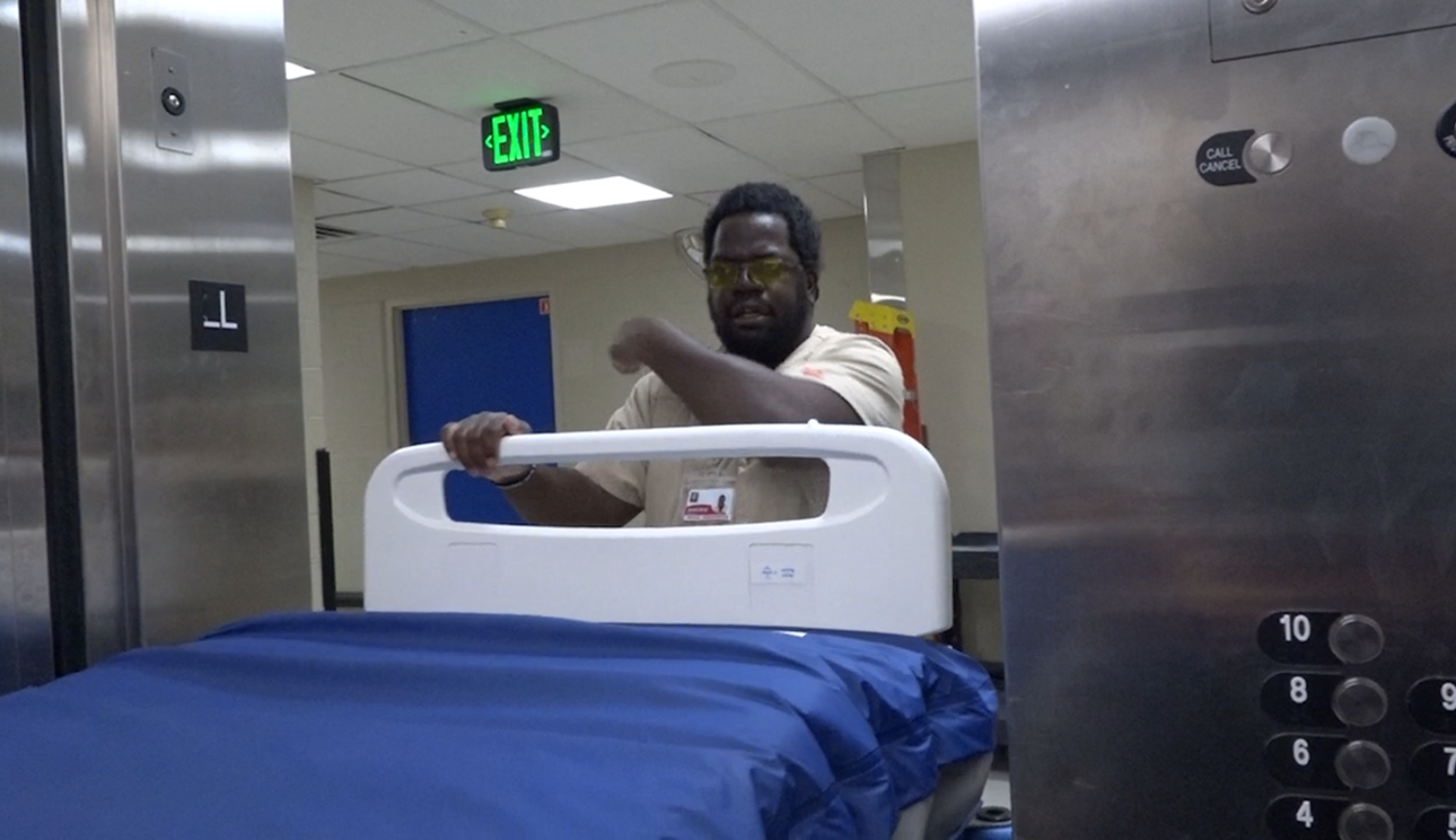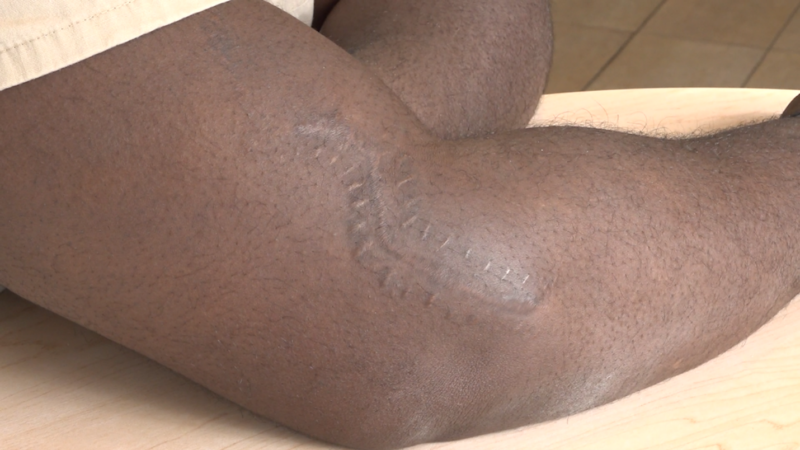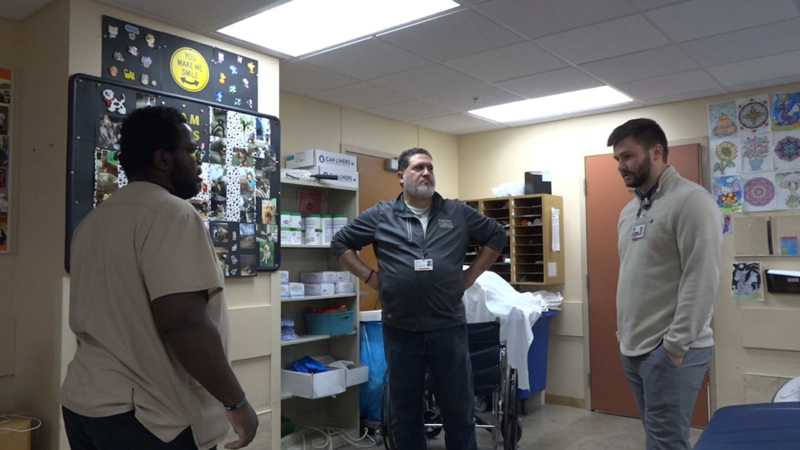After a near-death accident, one man journeys to live independently with a disability

Do you believe in second chances? What if it felt like you weren’t given any chances at all? That’s how it felt for one local man with disabilities. But as IPR’s Daniel Huber explains, after facing a near-death experience and receiving training from a local program, he’s got a fulfilling career and a better outlook on life.
Jean-Rony Warner is a transporter at the IU Ball Memorial Hospital in Muncie. His job is relatively simple, but important. He takes patients and equipment throughout the hospital. However, he has faced many challenges in his life.
Warner has q13 deletion syndrome, dyslexia and schizophrenia. He was born in Haiti and had to get surgery for a cleft lip. At four years old, Warner was adopted from Haiti and brought to Winchester, Indiana. After graduating from high school, he had to think about his life.
“At first, I had no intentions of being independent for a little bit, but I guess what drove me was – I wanted to be like, not really normal, I wanted to be like what everyone else has. I want whatever else has,” Warner said.
However, an accident would change his life. In 2016, a combination of things from his medication, to wanting to play chicken to the thought of ending his own life, led him to the train tracks. The moment he realized he didn’t want to get hit by the train, he said he, “heard a voice that was like ‘get your butt off the tracks.’” But it was too late.
“…instead of going all the way under and getting run over, it took my ankle just snapped it and just threw me,” Warner said.
He was rushed over to the hospital. The event left a mark, both physically and mentally.

The scar on Warner’s right arm. Warner said: “I make a ‘haha’ joke that it looks like train tracks. The train said, ‘Good job; you survived me.’” (Daniel Huber / IPR)
“I just want to sit here and mope, maybe go to the nurse for the rest of my life or whatever it is. This or that…” Warner said. “Or I can stop acting like that and just pick myself up and see what I can do to keep going, you know? And that’s what caused me to do that, you know, at the hospital. I wanted to give back for them helping me.”
So, after months of recovery, Warner went to Erskine Green Training Institute, a program for adults with disabilities. He enrolled in their healthcare program and was on the path to independence.
The Institute’s Director, Megan Stevenson, helped build the program in 2016. When she was brought on, she had to solve many questions to help solve one big problem.
“My job was kind of to create a structure for this post-secondary training program. So, building relationships with the hotel, the restaurant, and the hospital staff, learning the jobs, figuring out how long these training programs needed to be, how we should go about training them, what type of staffing we needed,” Stevenson said.

Megan Stevenson is looking at photos of EGTI graduates. They have so many pictures that they designated another wall to frame them. (Daniel Huber / IPR)
People with disabilities face low employment rates. The U.S. Bureau of Labor Statistics, in 2024, said that only 22.7% of people with a disability are employed. Programs like those at EGTI are looking to improve those numbers.
“The people don’t have high expectations for many individuals that we serve,” Stevenson said. “It’s a complicated reason why there’s such a high unemployment rate in people with disabilities, and I don’t know that there’s one reason, but we do know that developing skills leads to better employment outcomes, and that’s what EGTI is trying to do, is to develop skills.”
Warner graduated from EGTI in April of 2020 and has now worked at the hospital for five years in a position that fits like a glove.
“Yeah, it’s like a job, you know, but I come here and clock in, but you know what, it’s fun! We’re like family…” Warner said. “I got a great boss. I got a great crew. We help each other out if I don’t understand something.”
Warner’s leader and Manager for Transportation Operations at the hospital, Jordan Starks, says the partnership between EGTI and the hospital has been great.
“Seeing as though Rony is not somebody with a disability anymore – that that stigma has kind of gone away in our department. We know the training they’ve given. We know the training they’ve got. They’ve probably received training to be better transporters than what we offer here at the hospital through Erskine Green,” Starks said.

Warner (left), EGTI’s Manager of Community Outreach, Daniel Gurulé (middle), and Jordan Starks (right) are talking about Warner’s duties for the day. (Daniel Huber / IPR)
“I think people should be looking at us and give us a chance,” Warner said.
And for Warner, it was a chance at life in two ways.
Daniel Huber is a news fellow with Ball State Public Media’s Public Media Accelerator student fellowships.

